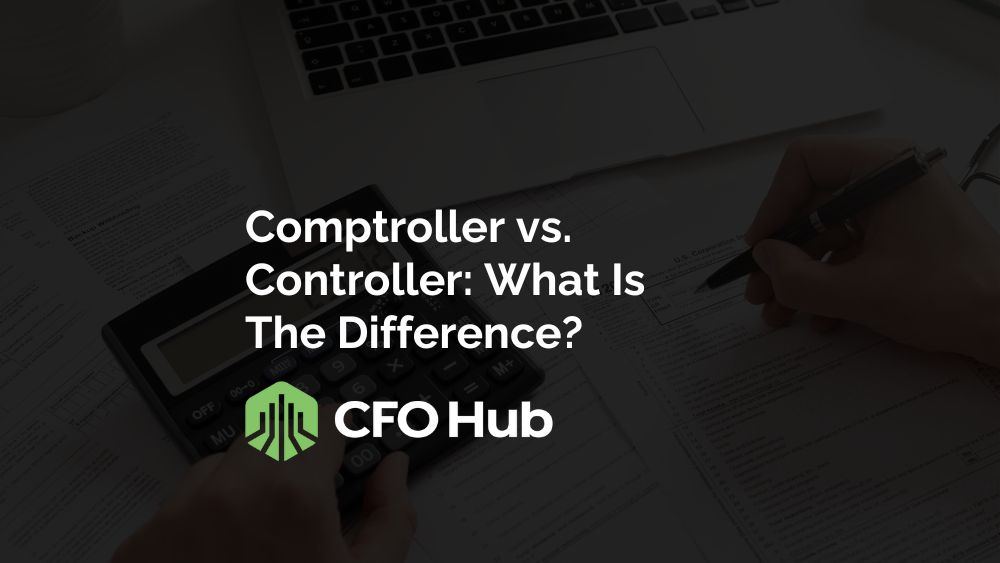Finding the right financial support can help your business grow and improve. But when it comes to a comptroller vs. controller, which do you need? The answer depends on your industry and goals.
Comptroller vs. Controller: The Key Difference
These two roles are very similar. The main difference is that comptrollers work for government and nonprofit organizations, while controllers work for private companies.
This means your industry controls the kind of support you should pursue. If you run a public organization or charity, search for a comptroller. If you run a for-profit business, you should search for a controller instead.
Other Similarities and Differences
Comptrollers and controllers have a lot in common. Both roles involve helping organizations understand their finances. For example, an expert in either position could help with:
- Managing cash flow
- Providing financial analysis and reporting
- Managing payroll and budgets
- Overseeing audits
- Developing future plans based on financial data today
However, the two groups approach these tasks differently. Comptrollers have a duty to whoever provides funding to their organization — potentially taxpayers or private donors.
Controllers have an obligation to maximize profits above all else. You can probably imagine ways in which that would change how they think about their role. It’s something to consider as you weigh whether these roles are interchangeable for your needs or not.
Finding Skilled Practitioners
Once you decide between hiring a comptroller or controller, the next step is finding the right fit. There are two main ways to add this kind of expertise to your team — internal hiring and outsourcing.
Adding to Your Internal Team
Hiring a full-time comptroller or controller could be right for your needs, depending on how extensive they are. For example, you wouldn’t need a full-time employee to get through an audit. But you might need one if your industry has strict reporting requirements on an ongoing basis.
The question to ask is whether this is the most affordable, convenient way to access the financial expertise you need. It may be, but for smaller companies and organizations, outsourcing can make more sense.
Outsourcing
Outsourcing involves hiring a service that can provide access to a comptroller or controller when you need it. For example, you could get some extra help during tax season with an outsourced controller.
The main advantage of this strategy is that it gives your organization more flexibility. You can easily scale up or down as needs change. Plus, you’ll still get access to a high-level expert. That way, you get the advantage of having financial expertise on your team without all of the commitments.
| Comptroller/Controller Salary & Outsourcing Costs | |
|---|---|
| Category | Details |
| Average Salary Range | $120,000 – $150,000 per year |
| Source | Perplexity Search, Idealist.org, ParentsTogether, Government job boards |
| Private Companies (Controller) | |
| Industry | Average Salary |
| Manufacturing | $150,000 – $180,000 |
| Professional Services | $220,800 – $304,300 (Median $260,500) |
| Small/Mid-Size (All Industries) | $160,000 – $200,000 (Base + Bonus) |
| Financial Services | $148,835 (Average); $158,990 (Senior Level) |
| Private Equity | $154,999 (Average); $170,000 (75th Percentile) |
| Source | Perplexity Search, Indeed, Salary.com, Robert Half |
| Outsourced Comptroller/Controller Services | |
| Hourly Rates | $50 – $350 per hour |
| Entry-Level Rates | $200-$350 per hour or $1,500-$3,000 per month |
| Intermediate Rates | $3,000-$6,000 per month |
| Advanced Rates | $6,000-$12,000 per month |
| Factors Affecting Costs | Experience, service complexity, location, industry specialization |
| Potential Savings | 25-50% compared to full-time in-house controller |
| Source | Perplexity Search, CFO Hub, outsourced accounting firms, ZipRecruiter |
| Robert Half Salary Guide Data | |
| Controller Salary Range | $150,000 – $160,000 per year |
| Bureau of Labor Statistics Data | |
| Financial Manager Median Salary | $156,100 (Range: $76,050 – $208,000+) |
Access Financial Services Faster with CFO Hub
Finding a talented comptroller or controller can be a lengthy, expensive process. CFO Hub can help you save time and money with an outsourced solution.
We provide easy, affordable access to high-level financial expertise. Whether you’re looking for ongoing monthly assistance or one-time guidance, we’ve got your back. So why wait? Take the first step toward your goals by setting up a free consultation today.
Mark is an accounting and finance professional with over a decade of experience in public accounting and consulting. As both an accountant and entrepreneur, he is passionate about helping clients strategically organize and grow their businesses to reach their goals.
Visit Mark's Expert Hub to learn more about his experience and read more of his editorial content

